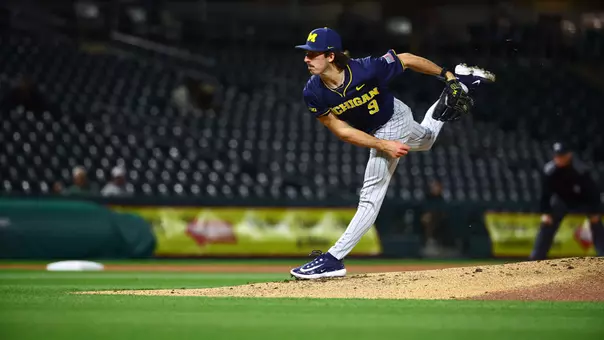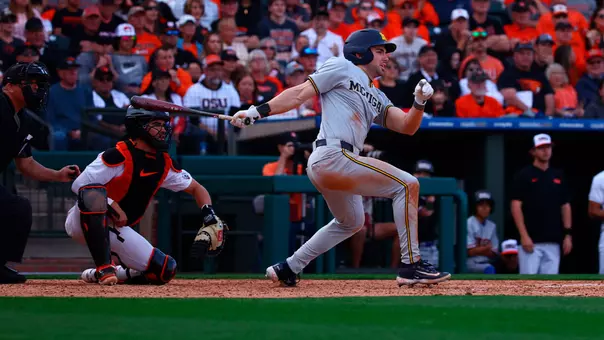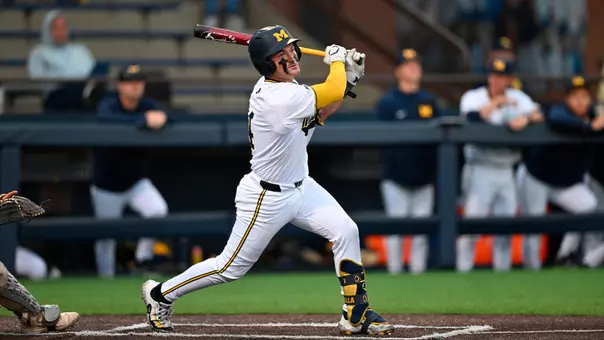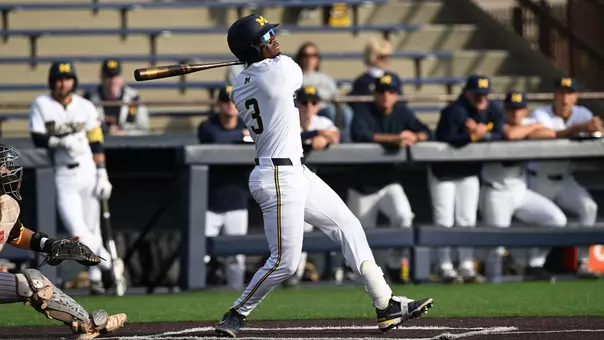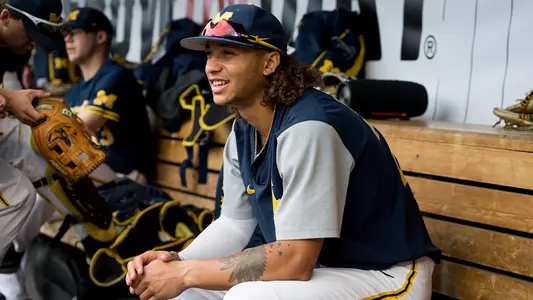
Native American Heritage Month: Jordan Brewer, Pokagon Potawatomi
11/30/2021 12:12:00 PM | Baseball, Features
By Barbara Cossman
As National Native American Heritage Month concludes, Michigan Athletics is proud to recognize baseball alumnus Jordan Brewer, a 2019 All-American and a key cog in U-M's College World Series finalist team.
ANN ARBOR, Mich. -- Jordan Brewer spent one year with the University of Michigan baseball team and there is no doubt he made the most of it. A transfer from Lincoln Trail Community College in Robinson, Illinois, Brewer was named all-region in 2018 and was all-conference in both 2017 and 2018. As a freshman, he hit .368 with nine home runs, 42 runs batted in and 45 runs scored. The following year he hit .367 with three homers, 31 RBI and 38 runs scored.
And then 2019 happened. The St. Joseph, Michigan, native headed to Ann Arbor to play for Erik Bakich and the Wolverines. The short story is, Michigan took the collegiate baseball world by storm advancing to the College World Series final. Brewer led the Wolverines with a .329 batting average, .557 slugging percentage, 25 stolen bases and 25 multi-hit games. Along the way, the junior picked up College Baseball Foundation first-team All-America honors, as well as a slew of second and third team recognitions.
The Big Ten Player of the Year, Brewer was selected by the Houston Astros in the third round of the 2019 Major League Baseball draft by the Houston Astros. This past summer, he played for the Fayetteville Woodpeckers, hitting .275 with six home runs and 41 RBI in 65 games played.
But Jordan is not just a baseball player. His heritage plays a prominent role in his life as a Pokagon Potawatomi on his father's side.


Q. Talk about your heritage and family background - what tribe are you a member of or associate most closely with?
A. I am Pokagon Potawatomi. I was born and raised in Southwest Michigan, where I have grown to love my tribe and their traditions.
Q. How does your heritage impact you personally, and how do you maintain a connection to it?
A. My heritage tells many stories about who I am and who my ancestors were. I have made a deep connection through playing baseball to inspire the Native youth. I am fortunate enough to be a part of the Nike N7 family, a line of Nike that promotes Indigenous and Native athletes to follow their dreams and that anything is possible.
Q. Broadly speaking, what does being Native American mean to you?
A. I am proud to be a Native American knowing what many of my ancestors endured. Growing up, I didn't really understand what it meant to be Native American. As I've grown and been able to learn more about my heritage, it has been such an essential part of my life being able to work hard to inspire other Native American and Indigenous athletes to follow their dreams because anything is possible, and I am a prime example.
Q. What's something about yourself most people don't know?
A. I received an honorary eagle feather, which is a high honor within my tribe.
Q. What did your time in Ann Arbor with Michigan baseball mean to you?
A. My story of how I got to U-M is really unique. After a couple of years at a junior college in southern Illinois, I had the opportunity to play for Coach Bakich. From being on this team, I learned a lot more than just baseball. I learned how to be a Michigan man. I cherished every second of being on that team.


Did You Know?
The Pokagon Band of Potawatomi is a federally recognized tribe with approximately 5,000 members in Southwest Michigan and Northern Indiana. Its governmental operations are located in Dowagiac, Michigan. The tribe received its federal recognition/reaffirmation of status in September, 1994 and has a land base of 4,700 acres.
Source: Inter-Tribal Council of Michigan, Inc.
Each Indigenous nation has its own creation story. Some stories tell that the Potawatomi have always been here. Other stories tell of migration from the Eastern seaboard with the Ojibwe and Odawa Nations. The three tribes loosely organized as the Three Fires Confederacy, with each serving an important role. The Ojibwe were said to be the Keepers of Tradition. The Odawa were known as the Keepers of the Trade. The Potawatomi were known as the Keepers of the Fire. Later, the Potawatomi migrated from north of Lakes Huron and Superior to the shores of the mshigmé or Great Lake. This location - in what is now Wisconsin, southern Michigan, northern Indiana and northern Illinois - is where European explorers in the early 17th century first came upon the Potawatomi; they called themselves Neshnabék, meaning the original or true people.
Source: Pokagon Band of Potawatomi

